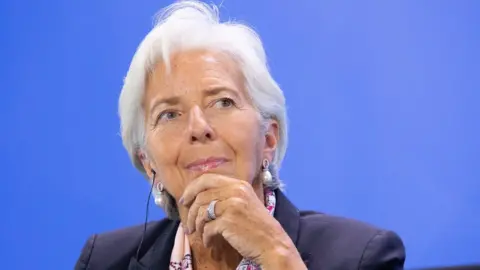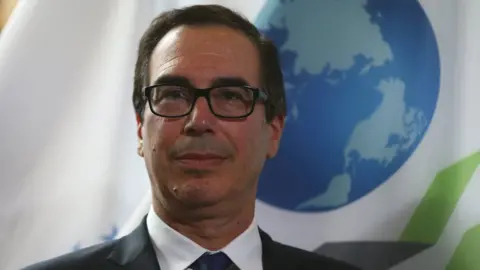IMF: US tariffs could undermine global trade
 EPA
EPAThe Trump administration's trade policies are likely to hurt the US economy and undermine the world's trade system, the IMF has warned.
IMF director Christine Lagarde said a trade war would lead to "losers on both sides" and have a "serious" impact.
The caution comes as the US prepares to levy new tariffs on $50bn worth of Chinese imports.
New duties on foreign steel and aluminium, announced in March, have already gone into effect.
Those tariffs have already prompted Europe, Mexico, Canada and China to introduce or announce plans for counter-measures in retaliation.
The move threw the G7 meeting last weekend into disarray, with US President Donald Trump retracting his endorsement of the joint statement and lashing out at host Canada.
While the IMF expects the trade dispute to have relatively minor economic impact - slowing GDP by a fraction of a percentage point - Ms Lagarde said she was concerned about how the fight would affect sentiment.
"What is more critical and more difficult to factor in at the moment ... is the actual impact on confidence," she said at a press conference in Washington.
The IMF said the White House, which has also threatened to withdraw from the North American Free Trade Agreement (Nafta), is responding to rising concerns about the side-effects of free trade.
"These measures, though, are likely to move the globe further away from an open, fair and rules-based trade system, with adverse effects for both the US economy and for trading partners," the IMF said.
Opposing outlooks
The IMF outlined the risks in its annual review of the US economy, which offered a bright near-term outlook.
The organisation forecasts US growth of 2.9% this year, as the Trump administration's $1.5tn tax cut package and $300bn increase in federal spending temporarily boost activity.
However, it expects GDP to slow to 2.7% in 2019 and 1.9% in 2020, trending lower as the decade continues and the effects of the tax cuts fade.
 Reuters
ReutersIn a statement, the US Treasury Department contested those predictions, saying White House policies, including tax reform and de-regulation, would result in "more sustainable economic growth".
"While we appreciate the IMF's work on their report and share similar short term forecasts on US economic growth, we differ significantly on the medium and long term projections," the US said.
Ms Lagarde said she hopes that Treasury Secretary Steven Mnuchin proves correct, but she is concerned about rising public debt and the risk of a sudden bout of inflation.
"Despite good near-term prospects, a number of vulnerabilities are being built-up," the IMF said.
New tariffs
On Friday, the US is expected to levy tariffs on about $50bn worth of imports from China, in response to alleged theft of intellectual property.
The US wants China to stop practices that allegedly encourage transfer of intellectual property - design and product ideas - to Chinese companies, such as requirements that foreign firms share ownership with local partners to access the Chinese market.
In April, the US published a list of about 1,300 Chinese products that would potentially be subject to tariffs. The list covered products of industries such as aerospace, information and communication technology, robotics and machinery.
After the US raised duties on foreign steel and aluminium imports in March, China imposed tariffs on US imports, including pork and wine.
It had previously said it did not want a trade war but would not sit by if its economy was hurt.
